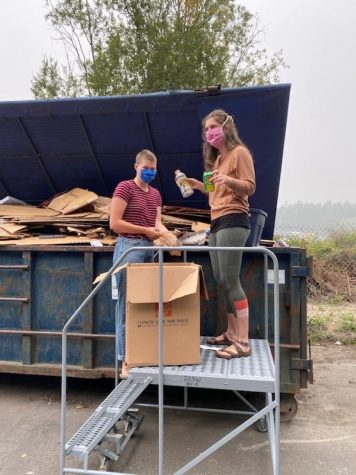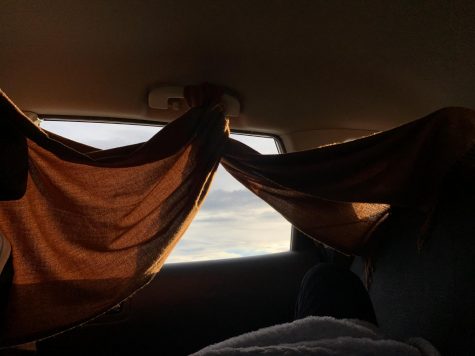Students on leave turn away from academics and toward themselves
September 24, 2020
By now, we’re all familiar with the daily commute from our kitchens to our desks and back. Zoom is now a noun and the timely muting and unmuting of a microphone is an envious talent. But for some Whitman students, this semester exists far outside of a computer screen. They’ve chosen to take a leave of absence, a gap year or even drop out altogether in response to online learning.
For sophomore Namy Barnett, the decision to take a semester off was simple. She had taken a gap year after her senior year of high school and one more semester was hardly daunting.
“I want to make sure that I’m comfortable with whatever I’m putting myself through,” she said.
The idea of another semester online is far from ideal for her. Barnett, like many others, found it difficult last semester to study online, so she reacted quickly upon receiving the news of an online semester.
“I was pretty confident that I’d be taking a leave of absence… the day that I got [President Murray’s email],” she said.
Paying a high price for online classes at a liberal arts college simply didn’t make sense to her. Instead, Barnett chose to take a few, more affordable community college classes to get some general education requirements out of the way.
This fall has opened her up to the idea of paths independent of a college degree. She stumbled upon a carpenter’s apprenticeship through a former teacher.
“[Carpentry has] made me a lot more confident. I could definitely go back to carpentry and make a business out of that,” Barnett said.
Pouring her focus into activities that genuinely interest her has made all the difference for Barnett during these past few months. However, she remains connected to Whitman in ways other than academics; she’s considering looking for job opportunities at ski resorts with other Whitman students for the winter.
“I’m not trying to be disconnected from the community,” Barnett said.
She likely will not be returning to Whitman in the spring if online learning continues. While this has been a difficult decision, Barnett is confident in her ability to follow her gut through these uncertain times.
Another student taking time off is Alli Shinn, a sophomore currently living with friends on Whidbey Island. Shinn found that virtual campus culture is not comparable to the real thing.
“Whitman students are creating something right now… that’s just not for me,” she said.
Her decision to take leave from college left her fearing that she would miss out on the creation of a new college experience. The reality that she would be out of the loop was daunting. It’s hardly a concern for her now as she follows her own interests.
“[I plan on] diving into my own curiosity,” Shinn said.
So far, she has abandoned several jobs because they weren’t what she wanted to be doing. For her, this time is meant to be spent enjoying time with her friends and reigniting her love of learning. High school took a toll on her passion for learning and she hopes to rediscover that during her semester or year off.
“There is no end date,” Shinn said.
Shinn is grateful for the space to explore herself and her friendships throughout the next few months. She sees her time away from Whitman as a privilege. The opportunity to explore her wants, desires and curiosity mostly free of financial worry is something she doesn’t take lightly, especially during the economic crisis in the US prompted by COVID-19.

But for some students, like Kristen Petrone, this isn’t an option. After one year at Whitman, she has officially dropped out.
“I kept telling myself that…I was ok with the debt and that I would figure it out after college,” Petrone said. “But once COVID hit…I thought on it.”
She wasn’t eligible for FAFSA off the bat and took out several loans. She remembers frequenting the financial aid office to try to sort out how to handle all the debt.
“I was in there at least once a month,” Petrone said.
The cost of attending Whitman wasn’t financially viable and Petrone realized that it wasn’t the only path available to her, despite her parents’ push to receive higher education. Once the pandemic hit, she saw that what was considered the most socially acceptable next step wasn’t for her anymore.
“I had an insight into institutionalism and the college experience that I hadn’t seen before,” Petrone said.
Not only was she no longer resonating with Whitman’s academic model and price-tag, but she was craving something more.

“I’d rather be working and helping my community than [working online],” Petrone said.
This realization not only provided clarity for Petrone but helped raise 40 million dollars for WISN.
Coming down from the summer, she has officially ended her internship and is in search of new work. Kristen plans on returning to community college at some point, but right now is seeking a less formal outlet for academics.
Petrone says she would have regretted staying at Whitman. She is left with the debt but has shifted the focus to herself and emerged more confident in opportunities to lead and make a difference in the world at the current moment.
The Whitman community has undergone radical, dynamic change this year, just like the rest of the world. Students were faced with a new reality, and some have turned down the offer on the table to listen to what inspires and works for them personally.




